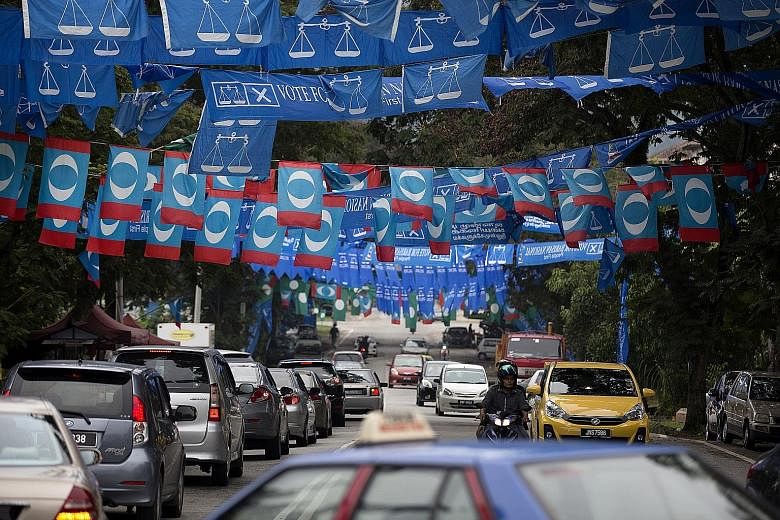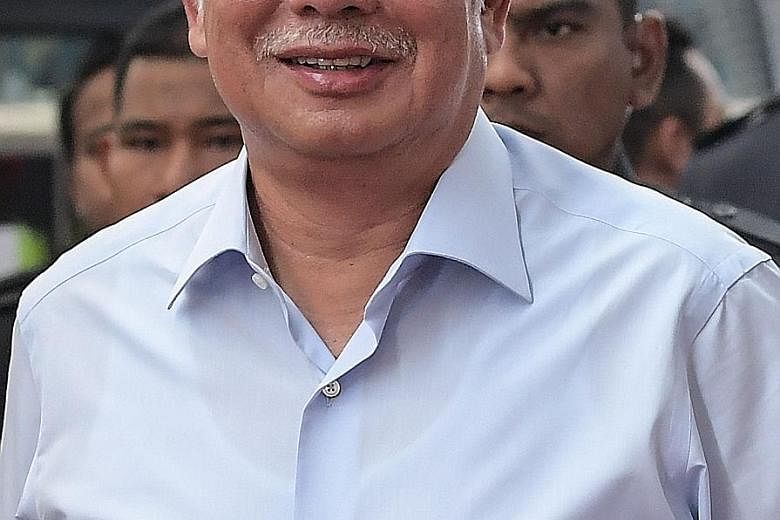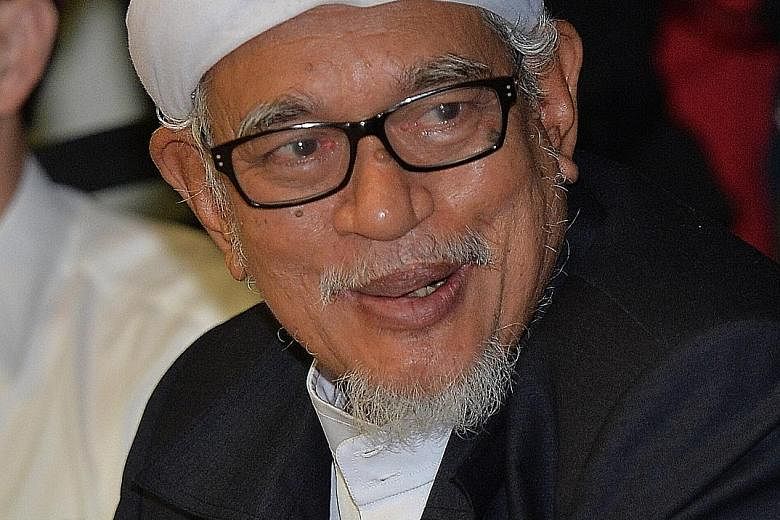As Malaysia's next general election inches closer, both sides of the political divide are zooming in on what is expected to be the biggest fight for votes: the hearts of the Malay majority.
The opposition expects most Malays to remain with the Umno-led Barisan Nasional (BN) coalition, but also that sufficient numbers could be convinced to switch to the opposition at the ballot box.
On the other side is Prime Minister Najib Razak's government, which is protecting its turf by rolling out programmes for the Malay community, which forms some 63 per cent of Malaysia's 28.4 million citizens.
The opposition, grouped under the tripartite Pakatan Harapan (PH) alliance and Tun Dr Mahathir Mohamad's Parti Pribumi Bersatu Malaysia (PPBM), says it has potent issues to weaken the government's hold on the Malays.
The main ones are the scandal involving state fund 1Malaysia Development Berhad and the spike in living costs, including rising housing prices.
-
Focus on 37 seats
-
There are 222 seats in the federal Parliament.
The 13-party Barisan Nasional (BN) coalition currently controls 132 wards.
The tripartite Pakatan Harapan (PH) alliance and Tun Dr Mahathir Mohamad's Parti Pribumi Bersatu Malaysia (PPBM) have a total of 75 seats now, and there is one independent MP - former Selangor menteri besar Abdul Khalid Ibrahim.
Parti Islam SeMalaysia has another 14 seats, but is not keen on joining the PH-PPBM pact. If it does not join the other opposition parties, the 14 seats will be up for grabs too.
PH-PPBM needs to retain the 75+1 seats, and win 36 more to get the minimum 112 wards to topple BN from power.
The opposition says 37 seats were won by BN with a margin of 10 percentage points or lower in the 2013 General Election. Of these, 31 are in Malay-majority districts.
This is where the opposition thinks the fight for the hearts of voters will be the most intense.
A breakdown of where the 37 wards are located:
• Johor, eight
• Kedah, seven
• Perak, five
• Pahang, four
• Penang, Selangor and Kelantan, three each
• Perlis and the federal territory of Kuala Lumpur, two each.
-
Trinna Leong
These troubles are being laid at the door of Datuk Seri Najib.
"Malay voters are gravitating to the opposition because of their negative perception of Prime Minister Najib," said opposition MP Liew Chin Tong.
But for most Malays, especially those in the rural heartland, a vote for Umno is a vote for Malay nationalism. They are also comfortable with the pro-bumiputera policy that gives them priority in education and business using government largesse.
The expected steady support for BN by Malays dovetails with a similar embrace of the government from big rural bumiputera groups in Sabah and Sarawak, like the Kadazans and Ibans.
As for Chinese and Indian Malaysians in Peninsular Malaysia, many political pundits say these voters are likely to largely remain with the opposition as they seek increased government accountability and less racial undertones in public policy.
The 13-party BN coalition currently has 132 seats in the 222-seat federal Parliament, according to the official website of the Malaysian Parliament.
The PH-PPBM opposition alliance has a total of 75 seats now, and there is one independent MP.
One major opposition party, Parti Islam SeMalaysia (PAS), has 14 seats. But PAS is not keen to align itself with the PH-PPBM pact and is leaning towards Umno.
To win federal power at the next nationwide polls, expected to be held this year, PH-PPBM needs to win a minimum of 112 wards of the 222.
This means it has to win 36 more seats and bring over the independent MP.
To reach this target, opposition leaders are zooming in on 37 constituencies that BN won by 10 percentage points or lower in the 2013 General Election.
Among these wards, 31 have at least 50 per cent Malay voters.
The opposition thinks it could turn around most of these 37 seats.
One new tactic to loosen Umno's grip in the Malay heartland - announced recently by the Chinese-dominated Democratic Action Party - is to form a bureau "to champion the cause of Felda settlers".
Felda is the Federal Land Development Authority that gave land to poor Malay settlers from 1957 to 1990.
These settlers, their children and grandchildren are staunch supporters of Umno in 54 Parliament and 92 state assembly constituencies, as they get many government handouts.
The opposition is also banking on the star power of PPBM chairman Mahathir and its president, former deputy prime minister Muhyiddin Yassin, who were former top Umno leaders.
But PM Najib is not sitting idly.
Presenting the 2017 Budget last October, Mr Najib promised to hand out more aid and financial assistance to rural folk and civil servants, most of whom are Malays.
And in the last few weeks, he has been busy launching new housing projects for the lower middle-income group that will mostly benefit Malays, as the lack of affordable homes - those priced below RM300,000 (S$95,500) - is a huge public drag on the government.
"We care about the people's aspirations. Poor or rich, their dream is to buy their first and own home," he said in Kedah three weeks ago.
"Not only are we creating opportunities to own affordable homes, we are transferring wealth in the form of properties to the people."
Analysts say the opposition would find it tough to steal votes in Malay-majority constituencies, even those won by narrow 10-point margins, because Umno has the best ground machinery.
"The likelihood of boosting votes for BN in these vulnerable areas is high if the party machinery works at full force," said political analyst Amir Fareed Rahim of KRA Group consultancy.
"The BN coalition has superior ground machinery compared with the other parties in the Malaysian political system."
Added to this is the Achilles heel of the opposition: Islamic party PAS, which has a stronger hold among Malay voters than the other opposition parties.
To neutral observers, the absence of PAS in the PH-PPBM pact shows that the opposition remains divided.
"The chances of BN winning marginal seats remain good given that the opposition is fragmented and beset with infighting," said Mr Ibrahim Suffian, director of independent pollster Merdeka Centre.




